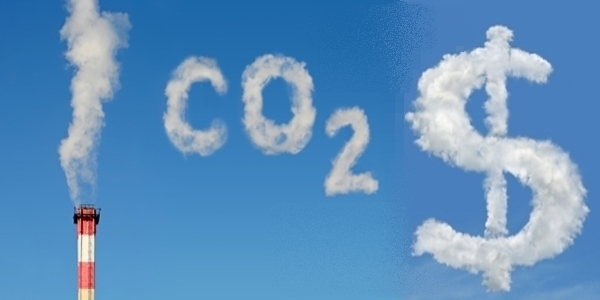One suggestion for dealing with greenhouse gas emissions is to implement a revenue-neutral tax on carbon emissions. If we implemented a carbon tax and cut income taxes by the same amount, we would be reducing taxes on something we want (income) and increasing taxes on something we don’t (air pollution).
As good as it sounds, I’m skeptical of the merits of carbon taxes, even if our CO2 emissions cause global warming. Fossil fuels have been the energy source behind the remarkable economic progress we have had since the beginning of the Industrial Revolution. Taxing that energy source will lower economic growth. Reducing income taxes should increase economic growth, but the issue is more complex than just which tax would, in theory, be the least detrimental to growth.
Here are six reasons for my skepticism about carbon taxes.
1. Fossil fuels have powered the Industrial Revolution. Let’s say the Earth is 2 to 3 degrees warmer today than it would have been had the Industrial Revolution never occurred. Is that amount of warming worth it? Would you rather live in today’s world, or have the standard of living of people in 1750 and an Earth 2 to 3 degrees cooler? If that is the cost of the remarkable economic progress that has resulted from the Industrial Revolution, most people would gladly accept the warming.
2. Carbon taxes would slow economic growth not only because they would make the power that fuels it more costly but also because carbon taxes are unlikely to be revenue-neutral, even when their advocates propose it. Look at the value-added tax in the European Union, which was proposed as a revenue-neutral tax reform but sparked a substantial growth of government across the EU countries. Look at the federal income tax, which started as a progressive tax with a top marginal tax rate of 7 percent.
A carbon tax would not be implemented by an omniscient benevolent government that would produce the “optimal” policy, but by a democratic process laced with special interest politics and cronyism. A new revenue source, even if intended by its architects to be revenue-neutral, ultimately would lead to bigger government, placing even more of a burden on the productive capacity of the economy.
3. If we are concerned about our children and grandchildren, then combining the first two points, would we make future generations better off by leaving them a world that is slightly cooler but also poorer?
4. We should weigh the benefits as well as the costs of global warming. What if the people arguing human use of fossil fuels is warming the planet are right? CO2, which is often viewed as a pollutant, is necessary for plant growth, and a higher concentration of CO2 in the atmosphere will mean healthier plants. A warmer climate will mean a longer growing season, so we can better feed our population. It would allow cultivation of land that currently is too far north. People in some places would surely be made worse off from a warmer planet, but people in other places—such as Siberia and Canada—would be better off. People are mobile, and populations would shift as climate change made some places more desirable than others. Global warming would bring benefits as well as costs.
5. There are benefits to waiting to deal with global warming, if it is a problem. One is that technology will develop so that it will become cheaper to reduce greenhouse gas emissions in the future. For example, Air Fuel Synthesis is a company that takes CO2 from the air and hydrogen from water to make oil. I don’t know whether this is the winning technology, but over time more technological advances like this will occur, making it more cost-effective to deal with greenhouse gas emissions.
Also, people get wealthier over time (if we don’t kill the goose that lays the golden eggs) and are willing to pay more for “green” energy. People in wealthier countries are choosing to spend their own money to buy solar panels to generate electricity, and to engage in other “green” activity without government mandates telling them they have to. If it is desirable to do something to mitigate greenhouse gas emissions, there are some benefits to doing something later rather than now.
6. Carbon taxes could increase emissions of greenhouse gases. If the United States implemented carbon taxes unilaterally, that would raise the nation’s cost of manufacturing, which would push manufacturing to other countries (such as China) where it produces higher emissions than in the relatively clean United States. The shift in manufacturing from low-emissions countries to high-emissions places would result in more greenhouse gas emissions.
People who are skeptical about global warming will, of course, see no reason for carbon taxes, but the six points above make the argument that people who think global warming is real and manmade also have good reason to question the desirability of carbon taxes.
Randall Holcombe ([email protected]) is DeVoe Moore Professor of Economics at Florida State University and research fellow at The Independent Institute. Used with permission of The Beacon blog of The Independent Institute.




